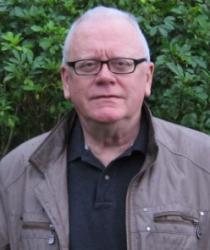
For a man who has spent much of his professional life criss-crossing the globe, it is surprising to hear Peter Harris admit that he was never much of a linguist at Bedales. “No, I was never much good at languages and the connection with China and Asia came a good deal later in life,” he reflects. “At Bedales, the people that I got to know and like best were often from foreign backgrounds. I was drawn to them, and they’ve tended to go on and do interesting things with their lives – one lives in Chile, another is a film-maker, and there’s a local politician and a child nutrition specialist among them as well.”
Peter landed in Block 3 with a sigh of relief, having just left his local private school in Hertfordshire and its vicious headmaster. “Walking into Bedales was pure pleasure by comparison,” he says. “The outdoor stuff wasn’t really my thing, but the fact that I couldn’t hit a cricket ball to save my life never seemed to matter and I found myself doing a lot of theatre work under the tutelage of the indomitable Rachel Carey-Field. I always remember being hauled off by her to speaking competitions, where the only male competitors were the boys from Bedales!”
Bedales also afforded Peter the opportunity to become involved with the wider arts. The editor of the school chronicle, Peter also edited a poetry magazine by the name of ‘Spondee’ and discovered the delights of music. “Despite the fact that my mother, who was Australian, was the most marvellous pianist, I didn’t really understand music until I arrived at Bedales,” he explains. “However, the teaching of music at school was so sensitive and finely wrought. Somehow, I ended up as second viola in the orchestra and for the first time, I discovered a new lifelong friend in the music of Bach.”
The end of Peter’s Bedales days was slightly more abrupt than he had anticipated. “Tim Slack decided that I should move on to Oxford and I was accepted there, with the original idea of studying Psychology, Philosophy and Physiology (PPP),” he recalls. “Before I went to Oxford, though, I had spoken to the brother of one of my Bedalian friends, who had been out to India to help at a place for Tibetan refugees. He persuaded me that I should go out and see it for myself, that I would benefit from helping others and he was absolutely right. I wrote to Freda Bedi, an Englishwoman turned Tibetan nun who was in charge of the refugee programme, was invited to go along and the experience changed my life.”
On his return, Peter determined to change his course to a degree in Chinese, which included a one-year language course in Hong Kong. “It takes a while to figure out what you really want to do with your life,” he observes. “I applied to the BBC World Service as a trainee initially and was hired by a man who said that my experience in India had convinced him to offer me a place. It was a pleasant place to work, but slightly incoherent and immensely internally competitive.” The two fields of Asia and human rights were now becoming Peter’s abiding preoccupations and so it was that after a year with the BBC, he moved to Amnesty International, working for three years on prisoner of conscience cases. “I think that I was the first researcher to be hired to work on China, and I probably made a bit of a hash of it, but I ended up in Vietnam towards the end of the American involvement there, which was a moving experience. Sean MacBride, the old Irish foreign Minister and Nobel Peace Prize winner, was chair of Amnesty at the time and was making political points over Vietnam. I can’t say I agreed with his policy and I was quite critical of it at the time.”
Having been in Hong Kong as a student at the height of the Cultural Revolution, Peter was intent on returning to China proper, now that Mao Zedong was dead and the country was inevitably changing. At the end of 1977, he arrived at Sun Yat-sen University in Guangzhou for a two-year stint as an English teacher. “It was the direct experience of living and working in mainland China that I was looking for,” Peter says. “China still had a Maoist complexion when I arrived, of course, and foreigners such as me were ignored for about my first year there. Things changed, though; Deng Xiaoping returned to the scene and once it was clear that he was the power in the land, there was a perceptible degree of relaxation throughout China.”
What Peter describes as a “lucky break” arrived next, in the shape of an invitation to work for Oxfam in Cambodia, overseeing the institution of a new development programme after the fall of the Khmer Rouge. Over the next three years, Peter divided his time between field director work for Oxfam and further stints with the BBC World Service. “I was then asked by Oxfam if I fancied going back to India,” he remembers. “Basically, it involved working on the state government-sponsored operational development programme in west Orissa and creating a new set of regional activities in support of local development NGOs. I’d known and loved India already, of course, and was delighted to head for Bhubaneswar, in Orissa, which is one of the poorest and most challenging environments in the entire country. The key to that part of India is to recognise that nothing moves quickly there. You develop extreme patience very soon or you go mad.”
His mission in India complete, there were to be final spells with Amnesty International and the BBC before the next phase of Peter’s life could begin in earnest. “I was extremely lucky to have the choice of working at places such as Amnesty, Oxfam and the BBC,” Peter acknowledges. “I must confess that when I went back to the BBC for the last time, my wife Vicky and I had just had twins, Max and Ben, and we both thought that if I was head of the Chinese section of the World Service it would be a relatively quiet post and I’d have more time with the family. As it happened, I was a few months into the job when the tanks rolled into Tiananmen Square and the broadcasting increased dramatically. It was a fascinating and also distressing time, but I was still itching to return to development work.”
A job offer from the US-based Ford Foundation appeared to provide a natural outlet for Peter’s ambition and talents. “They were a very persuasive and interesting outfit, with a major track record in philanthropy in general and human rights in particular,” he says. “After a short time in New York, I had thought that I would be sent to Delhi, which I rated the best job at the Ford Foundation. Vicky was keen to go to India too. But instead, it was back to China!” Although Peter had believed that he had now moved beyond this sphere of expertise, he and the family would now spend four further years in Beijing, a sojourn that was only terminated by his and Vicky’s decision to relocate the family to New Zealand, Vicky’s homeland.
“We had quite a debate about heading to Wellington,” Peter admits. “By this time we had three children – our daughter Alexis was born while we were in Beijing. Part of me was hankering for peace and quiet, while another bit of me was very tempted by going to Cairo with the Ford, which would have been the alternative. For her part, Vicky was enjoying China and had mixed feelings about going back to New Zealand, which she thought she’d left for good. In the end I accepted an offer to set up what is now the Asia New Zealand Foundation, which was a largely politically inspired attempt to strengthen ties between New Zealand and its Asian neighbours. The problem was that there was never enough money at the foundation, which was ultimately hugely frustrating. As a result, I gravitated towards academia. I became a Fellow in Politics at Victoria University of Wellington and was also asked to be the director of the newly-established Asian Studies Institute at the university. Once again, though, the Institute lacked the necessary funding and I started to think that I should mix the academic side with freelance work on development projects.”
From 1999, therefore, Peter took charge of a variety of human rights and civil society strengthening programmes in locations as far-flung as Indonesia, Cambodia and Kazakhstan, usually under contract to USAID. A Senior Fellow at Victoria University of Wellington for nine years from 2004, he is currently the Acting Director of the university’s New Zealand Contemporary China Research Centre, as well as a visiting professor at Nanjing (Nanking) University in China. His wife Vicky, meanwhile, has become a director in the New Zealand health system. It’s impossible to believe that Peter is now well into his seventh decade. “A surprising number of people have lived the kind of peripatetic lifestyle that I’ve enjoyed so much over the years,” he ruminates. “I’d like to think that the final chapters of it haven’t yet been written, either. Writing and translating things on pre-modern China, of which I’ve done a lot in recent years, has been a consistent joy and I intend to continue with that. We’re still in the market for more development contracts and Vicky and I are certainly open to the possibility of going abroad to live and work once more.”
While wrestling with the dilemma of whether to stay permanently in New Zealand or not, Peter has played host to a number of visiting Old Bedalians. “I always used to think of the school as very much an arts-focused place, but it seems to me that some of the most capable students of my era came from the sciences,” he suggests. “No school is perfect, of course, but Bedales was an important part of my life and I have the Bedalian connection to thank for the adventure that set me on my way in this slightly incoherent professional life that I have chosen. Coherent or not, I’ve had a wonderful time.”
Peter Harris was interviewed by James Fairweather in May 2014.
